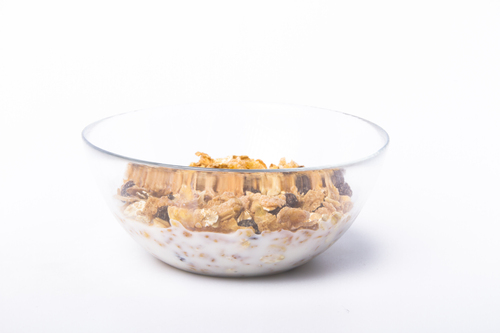Carbohydrate is stored as glycogen in muscles and the liver. Glycogen is the “quick energy” for muscle activity. Do you get enough carbohydrate?
How much carbohydrate do I need?
Carbohydrate is found in a variety of foods in every food group. More active individuals need more carbohydrate. Use the table below to help you get enough carbohydrate and meet all your other nutrient needs.
RECOMMENDED NUMBER OF FOOD GUIDE SERVINGS PER DAY* |
|||
FOOD GROUP |
AESTHETIC SPORTS
|
MOST ATHLETES |
ENDURANCE SPORTS
|
VEGETABLES & FRUIT |
Minimum 6–7 |
8–14+ |
15+ |
GRAIN PRODUCTS |
Minimum 6–7 |
8–14+ |
15+ |
MILK & ALTERNATIVES |
Minimum 3 |
3–4 |
4–6 |
MEAT & ALTERNATIVES |
Minimum 2–3 |
2–3 |
3–4 |
Adapted from Coaching Association of Canada for teens and adults (ages 14+ years)
*See Canada’s Food Guide for examples of Food Guide Servings
The best carbohydrate food choices are nutritious high carbohydrate foods from the four food groups. Foods such as fruit, potatoes, bread, pasta, rice, cereal, legumes, milk (regular, chocolate or flavoured), and fruit flavoured yogurt are preferred to less nutritious, high carbohydrate foods like sugar, candy and soft drinks, and meet your other nutrient needs.
How can I maximize muscle glycogen—the quick energy for muscle activity?
In addition to eating a high carbohydrate diet regularly, athletes involved in longer duration and/or intense activity can take the steps outlined below.
- Eat or drink high carbohydrate foods (i.e. fruit/fruit juice, fruit yogurt, crackers, chocolate/flavoured milk, bagels, cereal, low fat granola bars), ideally within the first 15–30 minutes of finishing activity.
- Consume several high carbohydrate snacks in the 2–4 hours after exercise. Be sure to follow up your snacks with a high carbohydrate meal (see the best carbohydrate food choices listed on this page).
- Include rest days after hard training or prior to competition (along with adequate carbohydrate intake), to ensure maximum filling of muscle energy stores. Remember, muscle glycogen stores take 24–48 hours to refill completely.
- Recent research has shown that chocolate milk is as effective (or better!) than commercial products designed for recovery from a rigorous workout. In addition to helping replace lost fluids, the amount of carbohydrate and protein in chocolate milk is ideal for exhausted muscles.
NOTE: Consume enough carbohydrate-rich foods before, during and after long, intense activity.
Why are carbohydrate foods so important?
Muscle glycogen depletion can occur during long, steady, intense activity (e.g. marathon running, cycling, cross-country skiing) and strenuous, intermittent bouts of exercise (e.g. hockey, volleyball, basketball, soccer).
Depletion can also occur over several days during training camps, tournaments, or repeated endurance training sessions without consuming enough dietary carbohydrate.
- Depleted glycogen stores lead to reduced endurance, fatigue and exhaustion.
- Eating carbohydrate foods is the only way to maintain and refill muscle glycogen stores.
- Carbohydrate needs vary from person to person (even within a specific sport). The recommended number of Food Guide Servings needs to be determined on an individual basis.
